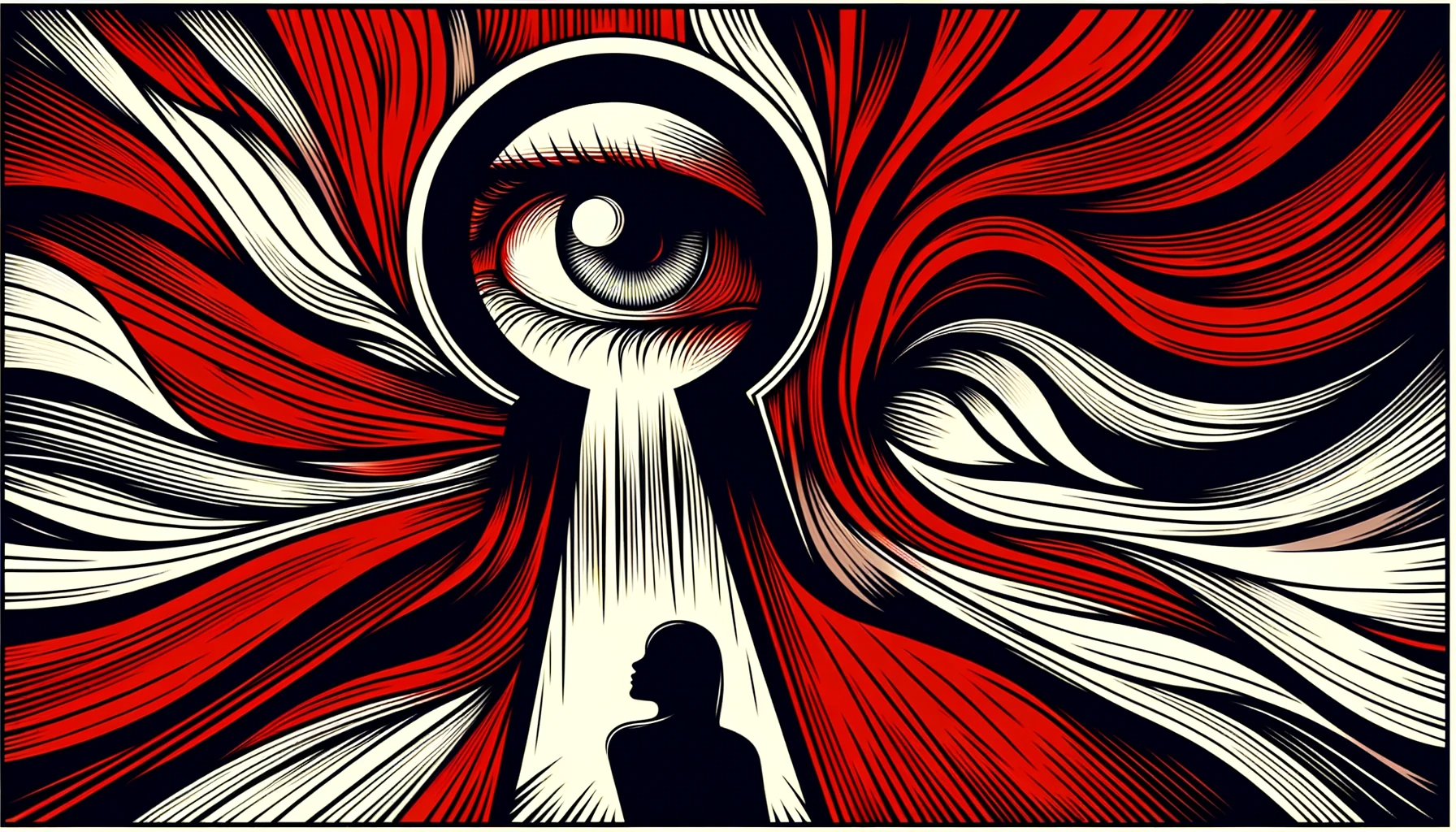Why Do We Judge?
Published by Ben Worrall 22nd February 2024

Most of us don’t consider ourselves to be judgemental people. Yet we’re constantly making judgements.
We judge situations, outcomes, others, and our behaviour. We assign positive or negative labels to everything we encounter.
But where does this addiction to judgement come from? And why does it play such a prevalent role in our lives?
The Origins of Judgement
To judge is to place artificial lines on reality.
Judgement arises due to subjectivity—a sense of myself and other.
As human beings, we’ve been gifted — or maybe cursed — with the ability to view reality through a personal lens and identify ourselves as separate from everything around us.
Judgement wouldn’t be possible without this duality. There would be nothing to judge as everything would already be you.
Identity
Judgement dances with identity. One couldn’t exist without the other.
Your identity is a mechanism capable of producing an endless flow of customized judgements. It’s the measuring stick that provides you with the point of reference needed to make judgements feel real and necessary.
Let's illustrate this with an example:
A woman wakes up and finds herself curled up in a ball in the middle of a lion’s cage. The lion is in the corner. It’s watching her with hungry eyes. She staggers to her feet and screams. This is bad. This is a bad situation. But this is also a subjective judgement. It’s not so bad for the lion after all. It’s pleased to be finally getting a good meal.
When the woman sees the lion, she makes an automatic judgement that the situation she finds herself in is a negative one. But there’s nothing inherently negative about this situation. It only appears negative to her because her identity is naturally tied up with her own survival.
Judgement is, of course, more complicated than this. We don’t just judge situations that threaten us but also things that have nothing to do with us, right?
Well, not quite.
Everything has something to do with us.
Why?
Because we’re the ones experiencing it.
Everything is filtered through our sense of subjectivity, therefore, we can’t help but pass judgement on how it relates to us.
The closer the situation or outcome appears to our sense of identity, the stronger the judgement.
Let’s expand on the previous example:
This time the same woman wakes up outside the lion's cage. She’s safe. However, she notices her sister is stuck inside the cage with the lion instead. This is just as bad as being in there herself. Why? Because the woman includes the threatened family member as an aspect of her identity. What happens to her sister is going to cause severe pain for her, and therefore the situation is still judged in the extreme negative.Can you see how our identity doesn’t just include our physical being but also our concepts and our beliefs? The woman identifies the sister as part of her sense of self and therefore still has a strong judgement about her being eaten by a lion.
If the woman notices a stranger in the lion’s cage, she would still have a strong reaction. The stranger — a fellow human being — is associated with her identity. There’s a common ground between her and the stranger. She can relate to the situation as if it were her in the cage. In other words, she has empathy for the stranger.
Judgement and Emotions
The everyday quality of our lives is affected by the judgements we make. This is because our emotions are heavily influenced by our judgements.
A situation involving a family member getting eaten by a lion is going to be judged by us as awful and therefore strong emotions will accompany it — extreme sadness, anger, etc. If we didn’t place any judgement on what was happening, there would be no reason for emotion.
The same applies to what most of us would consider a positive situation — a lottery win. The emotion of joy will arise in a situation like this because we’re judging the win extremely favourably.
We’re all searching for happiness. To seek this happiness, we try to increase the frequency we experience situations that we can judge positively while reducing those we judge negatively.
The problem with this approach is that we’re imprisoning ourselves in a never-ending cycle of extreme emotion. Placing too many judgements on life increases our sensitivity to these fluctuations until we eventually find our inner state completely submissive to the whims of life — many of which are outside our control.
Judging Ourself and Others
“Where is harm to be found? In your capacity to see it. Stop doing that and everything will be fine.” — Marcus Aurelius, Meditations
Most of us also live by a code of judgement which we apply to ourselves and others. These are social judgements which we have taken on, thanks to cultural imprinting.
Those who have strong notions of right and wrong are generally more judgemental.
You see this social and cultural judgement everywhere: in the media, at work, in your friends, your family, and yourself.
Sometimes judgement is necessary for the functioning of society, but usually, it is not. Falling into the trap of being too judgemental is going to hurt you far more than it’s going to change anything that you’re judging.
By making unnecessary judgements, you are essentially signing off on an artificial rulebook. You’re committing yourself to demonizing any violation of these rules.
What’s wrong with that? I hear you whisper.
Well, you become entrapped in your own snare. The judgments you make about other people are also applied to yourself. You’re now subject to upholding your own moral standards.
Imagine that you judge someone else for being overweight. You are setting weight as a measure of righteousness and claiming it’s important to you.
So what happens if later in life you find yourself getting slightly overweight?
It’s going to be profoundly painful.
You’ve crossed your moral lines. You can’t just view the weight gain as an objective situation. There’s a negative meaning attached to it, and this is accompanied by the intense emotions we mentioned earlier.
Your name has been written in your own naughty book.
Now maybe you’re thinking: Well, that’s good! If I do something that crosses my moral lines, I should consider myself bad and work to change the situation.
Sure. You can view it that way. But what does negative judgement and emotional pain have to do with changing the situation?
If you want to tackle your weight problem, it’s in your power to do so. You don’t need all the mental baggage that comes along with it.
You might find that intense self-judgement actually hinders your ability to change because you’re more likely to deny or blind yourself to the issue. Facing it head-on is more painful as so much negative meaning has been attached to it. Therefore it’s ignored. The same could be said for any strong judgement you hold.
Judgemental Societies
Take a moment to consider what rights and wrongs have been programmed into you since early childhood. These are what you’re going to be most judgemental against.
Let’s experiment.
Imagine that from the moment you were born up until your eighteenth birthday, you were told that not wearing socks was the most disgusting thing you could possibly do.
At the age of three, your parents would reprimand you if they ever saw you without socks. Being caught in school without socks would lead to embarrassment and punishment. The commercials between your Saturday morning cartoons promoted sock brands and their importance.
Well, as an adult you’re going to have a pretty strong judgement towards anyone not wearing socks. God forbid you ever forget to put on socks. That would be a fate worse than death.
The point is that arbitrary social morals tend to lead to higher levels of judgement and this judgement in turn leads to greater levels of unhappiness within a society.
A Balance of Judgement
It’s important to realise that there are higher and lower forms of judgement. This higher and lower categorization is not based on some universal moral scale but on practicality.
A collective judgement against throwing your dog off a skyscraper is embraced for a reason.
Judgements against the actions above are the very foundations of a healthy society. Not only do we accept these judgements, we’re very glad of their implementation.
The problem arises when judgements are watered down and taken on without a practical purpose in mind, or for a very shallow purpose at best.
These lower judgements are used to manipulate and control populations. In abundance, they create division, encourage discrimination, and generally contribute to a society where people feel uncomfortable living authentically.
Letting Go of Judgements
Judgement is an unavoidable aspect of the human experience, but to live a happier life, it’s wise to become more aware of our judgements.
Noticing how our judgements are biased is the first step in reducing how much we judge. Letting go of judgement frees up our mental bandwidth, which can instead be allocated to making practical changes.
My personal belief is that we should be aiming to reduce the judgemental attitude of our societies, focusing only on passing judgement where necessary — such as protecting the individual’s basic rights.
While judgement has always been a part of our lives, and most likely always will be, it’s also important to remember that human culture and societies are evolving systems that can be changed for the better.
The complexity arises when we consider that judgement is necessary to make these changes. To improve, we first need to judge what needs to be improved. A completely non-judgemental attitude would be to accept everything without assigning labels of better or worse.
Therefore, let’s focus on making the highest, most inclusive judgements possible. Broadening our sense of identity to even greater heights, until we no longer see ourselves as limited human beings, but as agents of the stars whose judgements are aligned with the highest of universal values.
Ben Worrall





